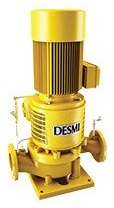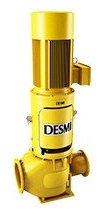
Centrifugal Pumps
Centrifugal pumps are mechanical devices designed to move fluids with the help of rotational energy from one or more driven rotors called impellers. Fluid enters the rapidly rotating impeller along its axis and is cast out by centrifugal force along its circumference through its vane tips. These pumps can be used in water, agriculture, sewage, petroleum, and petrochemical applications.
HVH Industrial works with the specialized engineering teams of manufacturers to meet the requirements and highest quality standards of our customers.
If you have any questions, write us via live chat (one of our team members will answer your questions), give us a call, or send us a quote request. The HVH team is always ready to help you.
 1(866)577-4040
1(866)577-4040
or
Centrifugal Pumps
Manufacturers
What is a Centrifugal Pump
A centrifugal pump is a hydraulic device that uses a rotating impeller to create a centrifugal force that moves water or other fluids from one place to another. The centrifugal pump is one of the most common pumps used for industrial and domestic applications. Centrifugal pumps are commonly used to move liquids through pipelines.
A centrifugal pump typically consists of a casing, an impeller, a shaft, a volute, a motor, and a drive system. The casing houses the impeller and the shaft, which is connected to the motor. The impeller rotates inside the casing, causing the fluid to be drawn in through the suction pipe. The liquid is then forced out through the discharge port and sent through pipes to the desired location. The impeller design, coupled with the casing design, is the most important factor in determining the pump's performance.

Centrifugal pumps are designed to be used both horizontally and vertically, depending on the application. Horizontal pumps are used for transporting liquids from one place to another, while vertical pumps are used for pumping up liquids from a lower level to a higher level.
Advantages and Disadvantages of Centrifugal Pumps
Advantages:
-
Centrifugal pumps are relatively inexpensive and require minimal maintenance, making them cost-effective.
-
Centrifugal pumps have a high flow rate and can move large volumes of fluid quickly and efficiently.
-
Centrifugal pumps are highly versatile and can be used for various applications, including water pumps, fire fighting, irrigation, etc.
-
Centrifugal pumps are relatively compact and lightweight, making them easy to transport and install.
Disadvantages:
-
Centrifugal pumps are not suitable for liquids with high viscosity, as the centrifugal force created by the rotation of the impeller will not be able to move these liquids efficiently.
-
Centrifugal pumps are designed to operate at high speeds; they are not suitable for applications requiring a low flow rate.
-
Centrifugal pumps are not suitable for handling liquids with solids or high levels of debris, as the debris can damage the impeller.
Applications of Centrifugal pumps
Centrifugal pumps are used to transport water from low-lying areas to higher regions for human consumption and other purposes. Also, centrifugal pumps are used for water treatment to transport wastewater from one area to another for filtration and purification. In addition, they are used in irrigation to transport water from wells, rivers, and other sources to agricultural fields. Finally, centrifugal pumps are used to transport water to power plants for hydroelectric power generation, as well as transport various chemicals and other fluids used in the pharmaceutical industry.
Centrifugal pumps are easy to maintain but require regular maintenance to keep them running efficiently. The impeller should be cleaned regularly, and the pump should be checked for any signs of wear and tear. Regular maintenance will help ensure that the pump is operating at its best and that it is not leaking or malfunctioning.
















